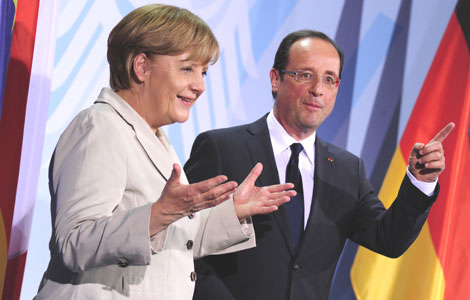
German Chancellor Angela Merkel and President Francois Hollande of France address a news conference on Tuesday in Berlin. The two leaders discussed the Greek situation and the best way to get the eurozone out of its present crisis.?[Photo / Agence France-Presse]
Greek uncertainty may harm value of reserves, economists warn
The government must guard against losses in euro assets amid uncertainty in the eurozone as Greeks head to the polls again on June 17, financial experts said.
The Greek crisis could see the euro drop, Liu Mingli, a researcher with the Institute of European Studies at the China Institute of Contemporary International Relations, said.
If Greece is forced to leave the eurozone "it will be the first domino to fall and panic will soon spread to other countries such as Portugal, Ireland and Spain", Liu said.
China should also plan in advance to protect euro assets which account for 10 to 20 percent of its $3.3 trillion foreign reserve portfolio, just in case the eurozone eventually collapsed, he warned.
His comments came as inconclusive talks between German leader Angela Merkel and French President Francois Hollande were followed by a reminder from the German finance minister that Greek voters should not think that they can renegotiate rescue conditions.
EU officials fear that the Greek electorate could bring an anti-bailout party or coalition to power.
This, in turn, could see a Greek exit from the euro, a prospect being openly talked about by European leaders.
Opinion polls put Syriza, a left-wing bloc stridently opposed to the bailout, as favorites to win the election but still falling short of an overall majority.
People are concerned that an exit from the euro and bringing back the drachma, the former currency, could wipe out their savings. If Greeks actually reject the bailout then EU funding will stop.
The feeling that Greece has taken yet another step toward the unknown was reflected in remarks by IMF chief Christine Lagarde who openly referred to the possibility of Greece having to leave the eurozone.
"It is something that would be extremely expensive and would pose great risks but it is part of options that we must technically consider," she told French TV on Tuesday.
European leaders are publicly committed to keeping Greece in the eurozone and they even scheduled an urgent "informal dinner" next Wednesday in Brussels to find compromises between austerity and growth.
Stock markets have fallen sharply on euro fears.
Europeans are also worried about differences in approach between Paris and Berlin, the main drivers of the EU.
Hollande reiterated his desire to renegotiate the recently agreed Fiscal Pact during the meeting with Merkel in Berlin following his inauguration on Tuesday.
Both leaders said they want Greece to stay in the eurozone and they said they respected Greece's decision to hold a new general election.
Analysts said Europe had entered into a "critical and precarious" phase. European Council President Herman Van Rompuy said it was like "building a lifeboat while being at sea".
Though Brussels did not announce discussion points of the urgently scheduled "informal dinner" next Wednesday, Greece and the euro will top the agenda and upcoming G8 and NATO summits will also be discussed.
Jonathan Holslag, research coordinator of the Brussels Institute of Contemporary Chinese Studies, said the Wednesday dinner is an occasion for leaders to show their political will.
"Greek politicians seem not to have any option but to stay in," Holslag said.
"Overall, European leaders are committed to keeping Greece in the eurozone."
Wolfgang Pape, a former member of the European Commission, agreed that these are difficult times.
"Nevertheless, it is still too early to talk about Greece leaving the euro. Even if this did happen it would be a very long process.
Pape said he is optimistic about the election as he believes that parties supporting the bailout will emerge stronger.
Christos Vlachos, director of Athens-based China-Greece Business Council, also said Greece faces a dilemma, no one wants austerity and no one wants to leave the euro.
Recent polls consistently show about 80 percent of Greeks would like to stay in the euro.
Impact on China
Wei Liang, a researcher with the Institute of World Economic Studies at the China Institute of Contemporary International Relations, suggested replacing euro assets with German bonds.
China's outbound investment has been growing rapidly but not in Europe.
Liu, from the Institute of European Studies, said the situation could be advantageous for Chinese firms.
"Chinese companies will have the upper hand because Europe now faces a fund shortage."
Tan Xuan in Brussels contributed to the story.
Contact the writers at [email protected] and [email protected]
